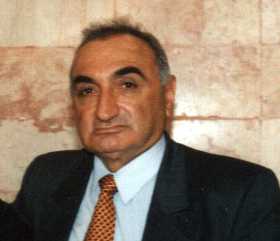

 (AINA) -- On the morning of February 18, 2001, Assyrians were enraged to learn that the Assyrian governor of the northern Iraqi province of Arbil, Mr. Franso Hariri was assassinated in Arbil. Mr. Hariri was the highest ranking Assyrian member of the predominantly Behdanani Kurdistan Democratic Party (KDP). His appointment as Governor of the ancient Assyrian city within the heartland of historic Assyria at one time proved a powerful political symbol to Assyrians of their historic link to the land. Mr. Hariri was reportedly also a central committee member of the KDP. In many ways, Mr. Hariri was believed to be an important check on an otherwise blatantly accelerating Sorani- Behdanani drive to cleanse northern Iraq of the indigenous Assyrian population. In the end, this very perception of Hariri's role in the preservation of Assyrian lands and demography may have resulted in his brutal assassination.
(AINA) -- On the morning of February 18, 2001, Assyrians were enraged to learn that the Assyrian governor of the northern Iraqi province of Arbil, Mr. Franso Hariri was assassinated in Arbil. Mr. Hariri was the highest ranking Assyrian member of the predominantly Behdanani Kurdistan Democratic Party (KDP). His appointment as Governor of the ancient Assyrian city within the heartland of historic Assyria at one time proved a powerful political symbol to Assyrians of their historic link to the land. Mr. Hariri was reportedly also a central committee member of the KDP. In many ways, Mr. Hariri was believed to be an important check on an otherwise blatantly accelerating Sorani- Behdanani drive to cleanse northern Iraq of the indigenous Assyrian population. In the end, this very perception of Hariri's role in the preservation of Assyrian lands and demography may have resulted in his brutal assassination.
Mr. Hariri had previously been the target of other assassination attempts (AINA August 19, 1997). Although details surrounding his death are still sketchy, in the past Mr. Hariri had been targeted by Sorani "hit squads" belonging to warlord Jalal Talabani's Patriotic Union of Kurdistan (PUK). Equally relevant, though, is that the appointment of an Assyrian to such a prominent position never quite sat well with many Behdanani tribal insiders of the KDP who regularly argued and worked for a "demographically pure" northern Iraq devoid of the indigenous Assyrian population. It is widely accepted that on account of his Assyrian roots, Mr. Hariri was always a doubly hated target of the PUK, the central Iraqi regime, as well as numerous KDP insiders.
The assassination of Mr. Hariri culminates three especially trying months for Assyrians in northern Iraq who continue to witness intensified intimidation and harassment. In the Nahla region of northern Iraq where Assyrian villages have remained under constant threat of expulsion by Behdanani KDP terrorist units (AINA October 16, 1999 and AINA November 30, 1999), another two Assyrian villages, Dawria and Girbesh, were formally divided primarily amongst Behdanani occupiers and a few Assyrian villagers remaining in their homes. Since December, 2000 Assyrian lands in Zakho and Dohuk have reportedly been illegally expropriated by Massoud Barzani's nephew Najervan who now heads the parliament in northern Iraq. These Assyrian lands have reportedly been commercially developed into hotels and retail outlets by those with tribal connections to the Barzani clan without due process or compensation to their Assyrian owners. In Sarsing as well, Assyrian lands are being confiscated and subsequently appropriated to illegal occupiers often with ties to the tribal hierarchy. As with previous assassinations of Assyrian leadership, it is believed that such attacks are intended to quell Assyrian demands for justice while continuing the Behdanani-Sorani ethnic cleansing of Assyrians from their territories.
Assyrians once again find themselves demanding an open investigation into the slaying of yet another Assyrian leader while also impressing upon the international community that the UN sponsored "Safe Haven" has led to greater and greater victimization of Assyrians at the hands of Soranis and Behdananis. As of yet, no credible claim for the assassination of Mr. Hariri has been identified. However, with an unusual singularity of purpose, the otherwise ostensibly warring PUK, KDP, and Iraqi regime have often demonstrated a cynical concurrence in their approach to suppressing Assyrian political, civil and human rights objectives. It remains to be determined which warlord's assassins were responsible for this most recent attack against the Assyrian Governor of Arbil, Mr. Franso Hariri.

or register to post a comment.